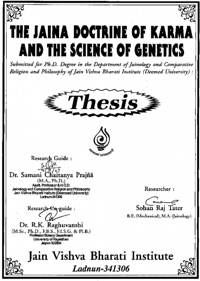Galton proposed the term eugenics for the science, which aims to improve the genetic endowment of human population. Eugenics has both negative and positive aspects.
(i) Negative eugenicsHilter sought to improve the German race by killing the weak and defective; this was negative eugenics. Nobody in the civilized world would approve of such a measure to improve the human race.
On the other hand, if people who are suffering from serious hereditary diseases are sterlized or otherwise debarred from producing children, there should be serious objection to marriage. The aim of negative eugenics is to reduce the frequency of hereditary disease and disability in the community to the least possible degree. However the question one would ask is how far negative eugenic measures would be helpful in eliminating genetic defect? The simple answer is that in spite of eugenic sterilization, new cases of hereditary diseases will continue to arise in the population partly because of fresh mutations, and partly because of marital alliances between hidden carriers (heterogyzotes) of recessive defects. Nevertheless, it may be hoped that should eugenic measures be applied, hereditary diseases would become less frequent. [45]
(ii) Positive eugenics
This is a more ambitious programme than negative eugenics. It seeks to improve the genetic composition of the population by encouraging the carriers of desirable genotypes to assume the burden of parenthood. At present, positive eugenics has very little application. Its realization is difficult for two reason:
The majority of socially valuable traits-let us say—intelligence and positive character features, though partially determined biologically are not inherited in such a simple way as, blood groups. These traits have a complex, multifactorial determination, both genetical and environmental. It would be difficult to expect, therefore, that positive eugenic measures will yield direct results. [46]
(b) Euthenics
Mere improvement of the genotype is of no use unless the improved genotype is given access to a suitable environment, an environment, which will enable the genes to express themselves readily. Throughout the course of history, man has been adopting environment to his genes more than adopting his genes to environment. Studies with mentally retarded (mild) children indicated that exposure to environmental stimulation improved their IQ. Thus the solution of improving the human race does not lie in contrasting heredity and environment, but rather in mutual interaction of heredity and environmental factors. This environmental manipulation is called euthenics and has considerable broader prospects for success.
(c) Genetic Counseling
The most immediate and practical service that genetics can render in medicine and surgery is genetic counseling. [47] Genetic Counseling may be prospective or retrospective.[48]
Most genetic counseling is at present retrospective i.e. the hereditary disorder has already occurred with in the family. A survey carried out by the WHO showed that genetic advice was chiefly sought in connection with congenital abnormalities, mental retardation, psychiatric illness and inborn errors of metabolism and only a few sought premarital advice. The WHO recommends the establishment of genetic counseling centres in sufficient numbers in regions where infections disease and nutritional disorders have been brought under control and in areas where genetic disorders have always constituted a serious public health problem (i.e. sickle cell anaemia and thalassemia). [49]
The methods which could be suggested under retrospective genetic counseling are:
- Contraception
- Pregnancy terminatio
Sterilization depending upon the attitudes and cultural environment.
 Prof. Dr. Sohan Raj Tater
Prof. Dr. Sohan Raj Tater
 Doctoral Thesis, JVBU
Doctoral Thesis, JVBU